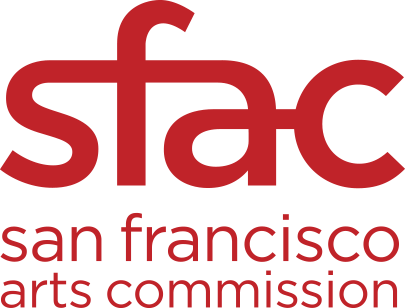Service Tension
A group exhibition featuring the works of six artists exploring the complexity of queer sexuality and power dynamics
The San Francisco Arts Commission (SFAC) Main Gallery is excited to present Service Tension, a group exhibition curated by Elena Gross and Leila Weefur featuring work by Salimatu Amabebe, Ricki Dwyer, Xandra Ibarra, Sasha Kelley, Tiona Nekkia McClodden, and Autumn Wallace. The exhibition will explore the messiness and complexity of the queer body.
The title, Service Tension, is an interpolation of “surface tension,” a phrase that signifies a resistant relationship between two surfaces and the title of the exhibition suggests a playful interrogation of sex, penetration, and power. The works in the exhibition trouble notions of masculinity within queer dynamics as well as sexual desire.
Oakland-based artist Salimatu Amabebe will create new work for the exhibition that explores the connections between traditional African spirituality, sexuality, and resource extraction through multimedia sculptural installations. Their work transforms Ijaw wooden sculptures into contemporary rubber objects, creating a juxtaposition of sacred objects and BDSM aesthetics, examining histories of exploitation in the Niger Delta while also reclaiming space for Black queer expression.
Ricki Dwyer’s work considers the intersections of material, industry, and the somatic. Dwyer’s work acknowledges drapery as a kind of negotiation that things never fall the same way twice. For Service Tension, he will be exhibiting a large textile piece that will be suspended from above the gallery, responding to and in tension with the architecture of the space.
Working across performance, video, sculpture, and photography, Oakland-based artist Xandra Ibarra creates work that addresses abjection and joy and the borders between proper and improper racialized, gendered, and queer subjects. In the exhibition, Ibarra will show a new series of photographs that look at the play of power and desire, dominance and subjugation in relational dynamics.
Sasha Kelley is an Oakland-based multidisciplinary artist whose work explores the topics of intimacy, collective archives, and collaboration with black/brown/queer communities. The photographic diptych in the exhibition foregrounds a sense of erotic empowerment through portraiture. With a subject whose playful gaze draws viewers into voyeuristic complicity, Kelley’s work transforms looking into a seductive negotiation—an intimate theater of power that unfolds when a body becomes both subject and spectacle.
Tiona Nekkia McClodden is a visual artist, filmmaker, and curator whose work explores and critiques issues at the intersections of race, gender, sexuality, and social commentary. McClodden’s work in Service Tension are part of a larger series of works entitled NEVER LET ME GO, incorporating rope and leather to play with the concept of being bound.
Philadelphia-based artist Autumn Wallace creates work that examines myth gender, sexuality, and the black femme experience. Wallace’s paintings and sculpture often feature figures tangled and wrapped up with each other; limbs holding, stretching, and curling around each other’s bodies. Unbound by physical restraints, the fluidity in Wallace’s work speaks to the rush of physical and emotional boundlessness with another.
“Service Tension examines how abstraction becomes a vessel for queer desire—a way to hold what cannot be directly shown,” states exhibition curators Elena Gross and Leila Weefur. “The exhibition dances between raw exposure and poetic restraint, navigating the exquisite tension between witnessing and participating. We're interested in how these artists create work that doesn't just represent queer sexuality but embodies it through material, form, and gesture. The works transform the gallery into a space where power dynamics are not just displayed but actively negotiated. Viewers become implicated in these scenes of intimacy, forced to confront their own position as voyeur, participant, or something beautifully in-between. In this way, abstraction doesn't obscure the messiness of queer bodies in contact—it reveals the profound truths that explicit representation often fails to capture.”
About the curators
Elena Gross is an independent writer, curator, and culture critic living in Oakland, CA. She specializes in representations of identity in fine art, photography, and popular media. Her research has been centered around conceptual and material abstractions of the body in the work of Black modern and contemporary artists and most recently in queer artistic and literary histories of the late 20th century. Elena is the co-editor, along with Julie R. Enszer, of OutWrite: The Speeches that Shaped LGBTQ Literary Culture (Rutgers University Press), winner of the 2023 Lambda Literary Award for LGBTQ Anthologies.
Leila Weefur is an artist, writer, and curator based in Oakland, CA. Through film and architecture, they examine the performative elements connected to systems of belonging, present in Black, queer, gender-variant embodiment. Their research, across disciplines, explores religion, Black ecological symbols and colloquial language, Transnational Blackness, and practices of collectivity.
Weefur’s writing has been published in SEEN by BlackStar Productions, Sming Sming Books, Baest Journal, and more. Weefur has worked with local and national institutions including BlackStar Productions, Princeton University’s Lewis Center for the Arts, CCA’s Wattis Institute, McEvoy Foundation, Berkeley Art Museum and Pacific Film Archive, Museum of the African Diaspora, and The Kitchen. Weefur is a lecturer at Stanford University and a member of The Black Aesthetic.
Image credit: Tiona Nekkia McClodden, NEVER LET ME GO | XII. only by special order [12], 2024. Black jute rope, leather, leather dye and Saphir shoe polish. Courtesy of the Artist.
Review of Service Tension (Roborant Review)
10 Bay Area Art Shows for the Dog Days of Summer Hyperallergic)
A Show of Queer Desire Pairs Abandon and Restraint (KQED)
SF/Arts Curator Insight: Service Tension (SF/Arts)


